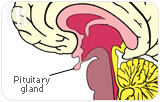Hormones are chemicals that control many of the body's different functions. The hormones estrogen, progesterone, and testosterone are responsible for the womanly changes in your body during puberty, menstruation, pregnancy, postpartum, and menopause. With all these hormone levels fluctuating, at some point in your life you may experience hormonal imbalance, where too much or too little of a hormone is released. This can have uncomfortable, unnerving, and even painful physical and emotional side effects.

Hormonal imbalance can be addressed by hormone replacement therapy (HRT). HRT is a prescribed treatment, in which external hormones are introduced into the body to counter fluctuating levels of estrogen, progesterone, and testosterone. HRT can be an effective treatment, as it takes effect immediately and works directly on hormone levels. But be aware that there are a number of risks and side effects associated with HRT. Read on to learn more.
Side Effects of HRT
HRT as a treatment for hormone imbalance can have a number of scary side effects. Estrogen replacement therapy can instigate the following:
- Headaches
- Nausea
- Dizziness
- Fluid retention
- Breast tenderness
- Depression
- Changes in sex drive
Side effects you might experience with progesterone replacement therapy include:

- Vaginal bleeding
- Hair loss
- Irritability
- Fatigue
- Muscle pain
- Vomiting
Although testosterone replacement therapy is uncommon, its side effects can include:
- Increase in LDL (“bad” cholesterol)
- Decrease in HDL (“good” cholesterol)
- Unexplained fatigue
- Mood changes
- Fluid retention
- Oily skin
- Enlargement of the clitoris
Risks Associated with HRT
As well as its side effects, HRT has more severe risks associated with it. HRT has been linked to a number of serious conditions including:
- Cardiovascular disease
- Breast cancer
- Uterine cancer
- Blood clotting
- Stroke
To avoid the sinister side effects of prescribed treatments, there are a number of non-hormonal ways to address hormone imbalance. Such treatments include simple lifestyle changes, herbal medicines, and bioidentical hormone replacements. Click here for more information on prescribed hormonal treatments and alternative treatments for hormonal imbalance.


